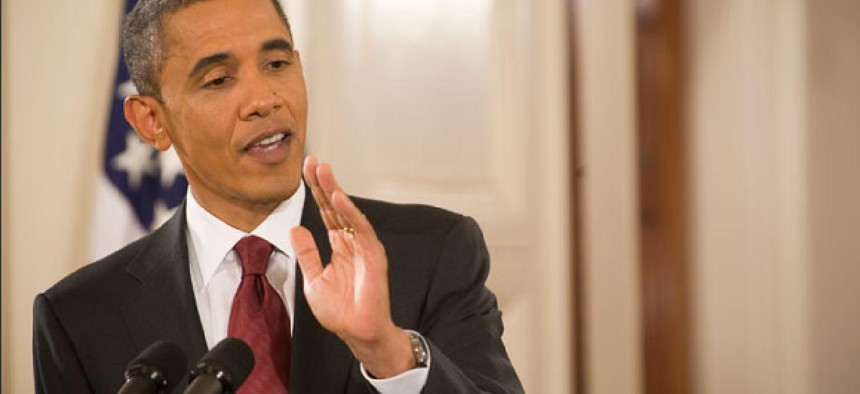
National Journal file photo
Election Rests on the Economy
In picking the next president, voters will be thinking about one thing more than any other. Who can blame them?
Regular readers of this column know that in analyzing the 2012 presidential race, I have been preoccupied—some would say obsessed—with the state and direction of the U.S. economy. Presidential elections have many moving parts and can turn on many things, but rarely is a single factor more important than the economy when an incumbent is up for reelection.
The latest NBC News/Wall Street Journal poll, conducted among 1,000 adults from April 13-17, supports that view. Overall, 49 percent said they approve of the job that President Obama is doing, and 46 percent said they disapprove. The poll, conducted by Democrat Peter Hart and Republican Bill McInturff, pegs Obama’s approval rating just 1 point higher than the current averages by RealClearPolitics and Huffpost’s Pollster.com, as well as the Gallup tracking average, for the week of April 16-22. Not much disparity there.
Obama’s lead in the horse race with Mitt Romney was 6 points in the NBC/WSJ poll, 49 percent to 43 percent. His advantage was a little less in some of the other surveys. RealClearPolitics pegged Obama’s lead at 3.7 points; Pollster reported 2.7 points. For April 18-23, the Gallup tracking poll had the president up by 7 points, 49 percent to 42 percent.
If you focus on the economy, though, the situation looks more complicated. Obama’s NBC/WSJ job rating on handling the economy is 45 percent approval and 57 percent disapproval. Those numbers are less favorable than his overall approval rating. When respondents were asked whether they thought Obama’s policies had helped or hurt economic conditions, or had made no difference at all, 36 percent said they had helped, 30 percent said they made no difference, and 33 percent said they had hurt. Obviously, you can push the “made no difference” group in either direction. But the 63 percent who said that Obama’s policies either made no difference or hurt economic conditions do not bode well for the president. When asked whether they thought the economy would get better, get worse, or stay about the same over the next 12 months, 38 percent said that it would get better, 42 percent said it would stay the same, and 19 percent predicted that things would get worse. With 61 percent believing that the economic picture will either get worse or stay the same, the public clearly remains very nervous about the economy—again, not good news for the president.
Respondents were given a choice of 13 positive attributes and asked whether each better describes Obama or Romney; the good news for the president is that the respondents associated 10 attributes more with him than with his challenger. They are, in descending order of advantage: “being easygoing and likable”; “caring about average people”; “being compassionate enough to understand average people”; “dealing with issues of concern to women”; “looking out for the middle class”; “being knowledgeable and experienced enough to be president”; “being consistent and standing up for his beliefs”; “sharing your positions on the issues”; and “being honest and straightforward.” Obama also had a narrow advantage, within the margin of error, on “setting the proper moral tone for the country.” Taken together, the results suggest that Obama’s reelection should be a slam dunk, right?
Not necessarily. Although Romney had the advantage on only two attributes, they were “having good ideas for how to improve the economy” (by 6 points) and “changing the business as usual in Washington” (by 7 points). Those sound a lot like central tenets of Obama’s campaign four years ago. So Obama had the advantage on most of the attributes, but Romney led on two of the most important ones. The results aren’t convincing enough to give the advantage to either Romney or Obama.
All of these findings reinforce the view that the economy will be a very important factor in the election, regardless of whether it improves or just bumps along. Obama badly needs the country’s economic performance over the next six months to validate his policies and decisions. If the overall economy improves, job creation increases, and consumer confidence goes up, those markers will serve as validation. If the economy is bouncing along, with growth at a subdued level and unemployment still at or above 8 percent—not the 9 percent of a year ago, but hardly in the 7.2-to-7.4 percent range that boosted President Reagan’s 1984 reelection fortunes after the 1982 recession—the public will be in no mood to validate Obama’s policies and decisions.
Gallup’s most recent polling suggests that Obama has received a bit of a boost from the decline in gasoline prices; his approval rating bumped up to 50 percent in three consecutive days of Gallup’s three-day moving averages. The bump shows just how volatile public attitudes are, particularly when important economic issues are involved. That volatility isn’t likely to change between now and Election Day. The economy will determine this election.
NEXT STORY: EPA official resigns over 'crucify' comment






